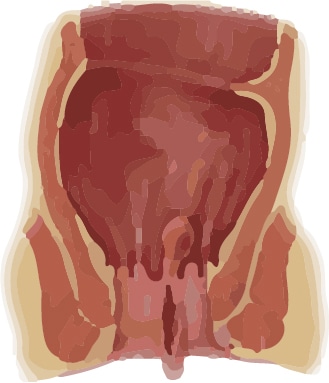
The most common indications of the presence of one or more enlarged and irritated anal papillae (plural) is a vague persistent feeling of uneasiness in the rectum, discomfort when sitting, and dull pain.
Papillae are very small cone-shaped or teat-like projections that are found protruding from an encircling ring at the upper end of the anal canal. The ring is a little more than an inch inside the anal opening. Ordinarily, papillae are about half the size of a safety match head and their presence is unknown to the individual and unfelt. Often papillae become bruised, cut, torn, or otherwise injured by the passage of a hard stool, by the presence of some hard particle in the stool (such as a nut shell fragment), or by the insertion of a rectal tube or syringe, etc. They then become acutely inflamed, swollen, enlarged, and very tender. The swollen masses extend into the canal of the rectum like sore thumbs. Subsequent stool passages add to the irritation by rubbing and pushing against the inflamed papillae during passage. As the trouble continues, the papillae increase in size. After the acute inflammation subsides, the swelling usually remains and the papillae become tough and fibrous.
Enlarged (hypertrophied) papillae are constant trouble-makers and unless they are skillfully and successfully cared for, they will not only become worse but often lead to more serious complications such as anal stenosis or anal fissure.

Try Dr.Cranford’s all nature stool softener. Col-eze absorbs water, and helps the bowel lead to normal movements.